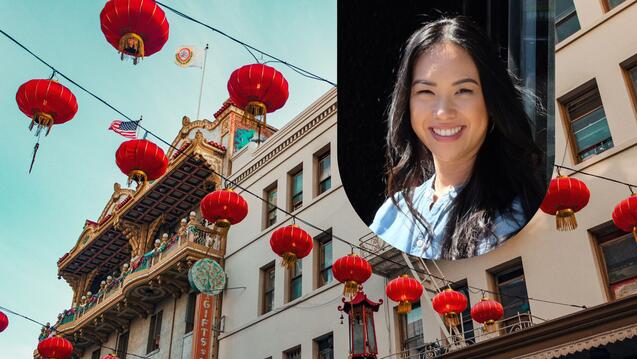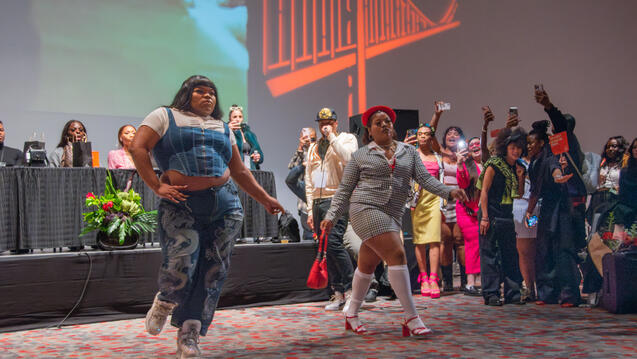Transformative Leadership alum Cynthia Huie, M.A. '24, brings creativity and connection to the San Francisco small-business community.

Writing Myself Into Existence
How CIIS' Women's Spirituality program brings forth the gifts of women
So many people flock to San Francisco for jobs, education, relation- ships, culture, and community that it’s rare to meet someone born and raised in the city.
Deborah Santana (Women's Spirituality ’14) is just that: a deeply rooted native San Franciscan who has nurtured a lifelong love for the Bay Area, its people, and its progressiveness.
She grew up on Majestic Avenue, a quiet residential street in the Ingleside neighborhood. Her father, famed R&B guitarist Saunders King, and his musical contemporaries helped the Fillmore District of the 1940s and 1950s to become known as “the Harlem of the West.” “Their art still echoes here,” Deborah says.
I want to ensure that my family’s legacy will remain part of San Francisco, so I purchased a San Francisco Historical Society medallion honoring my father on the corner of Grant and Sutter Streets. It’s imperative that we preserve the sacred origins of our ancestors.”
San Francisco’s vibrant ethnic and socioeconomic diversity was the perfect context for the creative ferment of the 1960s and 1970s. While the Grateful Dead, the Jefferson Airplane, and Big Brother and the Holding Company explored the limits of consciousness in the Haight, the Mission District experienced a similar cultural renaissance.
Politically charged murals blossomed on alley walls. Organizations like Acción Latina, Galería de la Raza, and the Mission Cultural Center began to take shape. Mission District musicians blended Latin rhythms with blues, funk, psychedelia, and jazz.
In 1972, Deborah married—the beginning of a relationship that would shape the course of her personal and professional life.
As a working mother, Deborah integrated the demands of family life and the managerial responsibilities of their family business. She explains, “When I was raising my three children, who are grown now, I had a diversity of roles that I was blessed to incorporate in my life: COO of our family business, vice president of our nonprofit foundation, mother, and spiritual practitioner. The lessons I learned in each of these roles shaped me, particularly as a female executive in the male-dominated music industry.”
Writing to Reconnect
Despite the fulfillment of a successful career and loving family, Deborah felt called to connect more fully with her own dreams and desires. In the mid-1990s, she enrolled in an autobiographical writing class.
“Mothering was the center of my life. There really is no ‘balance’ during that very active time, as most mothers know,” she says. “When I began to write, I struggled to carve time out for myself. I wrote myself into existence.”
From those first efforts, Deborah experienced her own creative revitalization. Her memoir Space Between the Stars was published in 2005, and she has since contributed essays to several anthologies.She is the producer of four short documentaries: The Road to Ingwavuma, released in 2006; Girls of Daraja, released in 2010; School of My Dreams, released in 2012; and Women’s Spirituality and Higher Education, released in 2014.
Women’s Spirituality and Higher Education profiles the CIIS Women’s Spirituality program, from which Deborah graduated in 2014 with a master’s degree in Women, Gender, Spirituality, and Social Justice. She was drawn to the program for its focus on philosophy and women’s expressions of spirituality and leadership. “I was seeking to expand my vocabulary about women’s ways of knowing, being in harmony with Earth and living beings, and the history of matriarchal societies,” she says.
The professors and students interviewed in Women’s Spirituality and Higher Education describe the Women's Spirituality program's aims and impact, and the parallels between the program and Deborah’s path are clear.
Professor emerita and Women's Spirituality co-founder Mara Keller says that Women's Spirituality classes help students find their way toward “reclaiming our spirituality...and bringing forth our gifts and talents as women of spirit.” Women's Spirituality Chair Alka Arora asks, “What happens when women put their own experiences at the center of their spirituality?”
Justice Can Prevail
Adjunct faculty member Annette Lyn Williams explains that Women's Spirituality classes explore how spirituality has sustained oppressed people. This focus of Women's Spirituality, too, resonates with Deborah’s lived experiences: “There has rarely been a day in my life that I have not been aware of my identity as a biracial woman of color. I live with the belief that although oppressive systems are created to prevent my success and joy, justice can prevail,” she says.
In 2008, Deborah founded Do A Little, a donor-advised fund at the San Francisco Foundation that supports the health, education, and happiness of women and girls. She is a founding donor of the Smithsonian National Museum of African American History and Culture, and serves on the national board of the Smithsonian Institution.
She is the recipient of several awards for her philanthropy and activism: a certificate of recognition from the California State Legislature, the Catalyst award from Bay Area Blacks in Philanthropy, and UCLA’s Cesar E. Chavez Spirit award, among others. “I’m an advocate for equality for all and work very hard to live the principles of fairness, compassion, and care for our environment and our world. I’m deeply interested in living in beloved community with others,” she says.
Deborah’s current projects reflect her passion for social justice. She is producing a third short documentary about the Daraja Academy in Kenya, a free boarding school for girls that she has been involved with since 2009.
“Two of the girls came to the United States earlier this year. Barbara Rick, the film’s director, and I plan to juxtapose their lives in Kenya with American life. We will highlight Daraja students’ achievements, including their successes on the national Kenya Certificate of Secondary Education test, and Daraja graduates who are leaders in their workplaces, families, and communities.”
Deborah is self-publishing a book of poetry, Silence Always Answers, and shaping a second memoir from her life.
Related Academic Programs
Related News
For the second year, CIIS’ Center for Black & Indigenous Praxis joined Generations, a celebration of Black LGBTQIA+ cultures in the Bay Area.
The Black Psychology Project and the Center for Black & Indigenous Praxis’ annual celebration of Black History Month returns.



